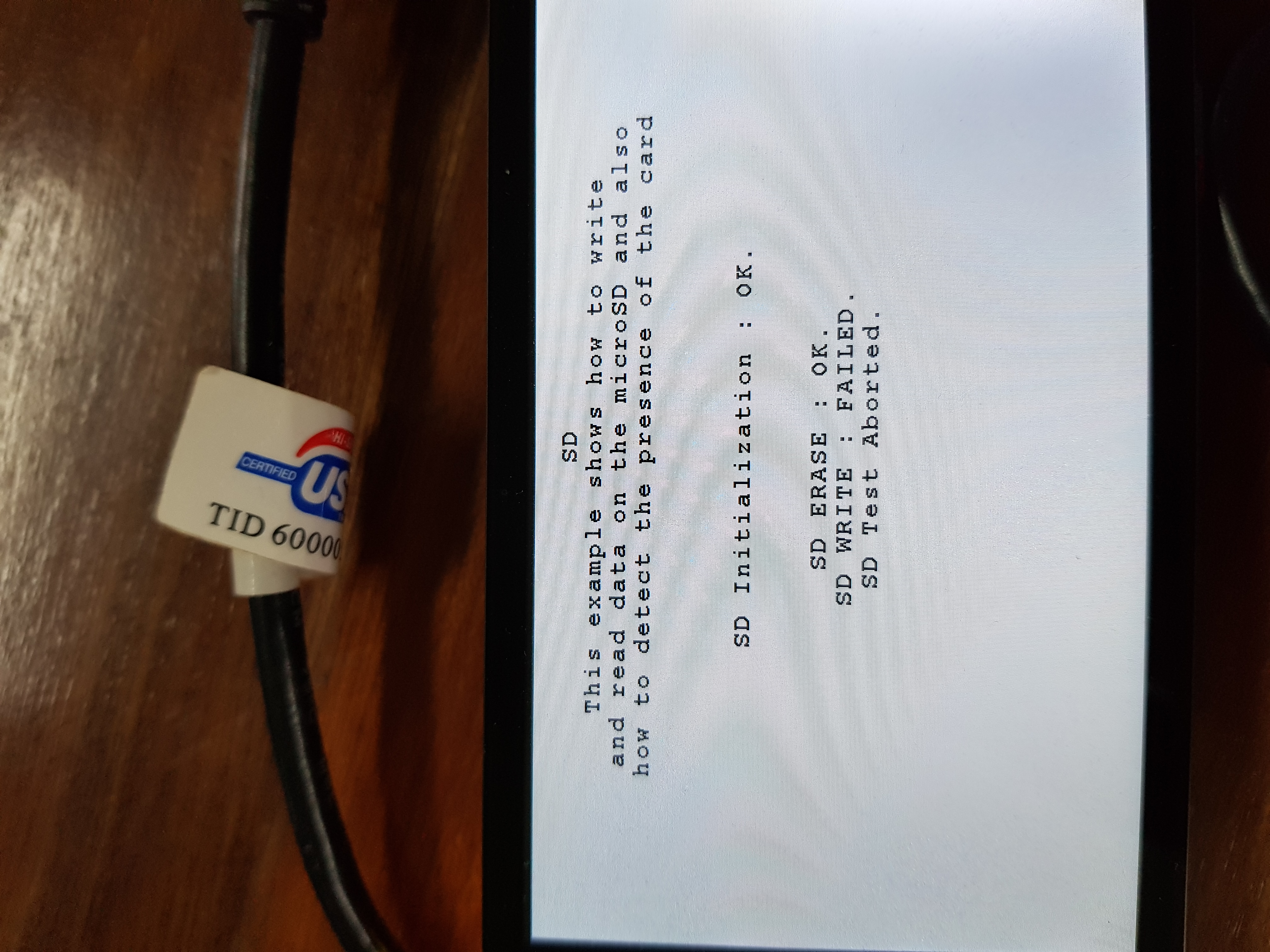Important changes to forums and questions
All forums and questions are now archived. To start a new conversation or read the latest updates go to forums.mbed.com.
7 years, 9 months ago.
Error run SD demo
I use STM32f469-Discovery, use to run SD demo on Mbed OS V2 without an error
now I try to run on the newest Mbed OS, the program compile just find but
can't write to SD card as I show on picture.
#include "mbed.h"
#include "SD_DISCO_F469NI.h"
#include "LCD_DISCO_F469NI.h"
SD_DISCO_F469NI sd;
LCD_DISCO_F469NI lcd;
DigitalOut led_green(LED1);
DigitalOut led_red(LED2);
Serial pc(USBTX, USBRX);
#define BLOCK_START_ADDR 0 /* Block start address */
#define NUM_OF_BLOCKS 5 /* Total number of blocks */
#define BUFFER_WORDS_SIZE ((512 * NUM_OF_BLOCKS) >> 2) /* Total data size in bytes */
uint32_t aTxBuffer[BUFFER_WORDS_SIZE];
uint32_t aRxBuffer[BUFFER_WORDS_SIZE];
/* Private function prototypes -----------------------------------------------*/
void SD_main_test(void);
void SD_Detection(void);
static void Fill_Buffer(uint32_t *pBuffer, uint32_t uwBufferLenght, uint32_t uwOffset);
static uint8_t Buffercmp(uint32_t* pBuffer1, uint32_t* pBuffer2, uint16_t BufferLength);
int main()
{
uint8_t SD_state = MSD_OK;
led_red = 0;
lcd.SetFont(&Font20);
lcd.DisplayStringAt(0, LINE(1), (uint8_t *)"SD", CENTER_MODE);
lcd.DisplayStringAt(0, LINE(2), (uint8_t *)"This example shows how to write", CENTER_MODE);
lcd.DisplayStringAt(0, LINE(3), (uint8_t *)"and read data on the microSD and also", CENTER_MODE);
lcd.DisplayStringAt(0, LINE(4), (uint8_t *)"how to detect the presence of the card", CENTER_MODE);
SD_state = sd.Init();
if(SD_state != MSD_OK){
if(SD_state == MSD_ERROR_SD_NOT_PRESENT){
lcd.DisplayStringAt(0, LINE(5), (uint8_t *)"SD shall be inserted before running test", CENTER_MODE);
} else {
lcd.DisplayStringAt(0, LINE(6), (uint8_t *)"SD Initialization : FAIL.", CENTER_MODE);
}
lcd.DisplayStringAt(0, LINE(7), (uint8_t *)"SD Test Aborted.", CENTER_MODE);
} else {
lcd.DisplayStringAt(0, LINE(8), (uint8_t *)"SD Initialization : OK.", CENTER_MODE);
if(sd.Erase(BLOCK_START_ADDR, (512 * NUM_OF_BLOCKS)) != MSD_OK){
lcd.DisplayStringAt(0, LINE(9), (uint8_t *)"SD ERASE : FAILED.", CENTER_MODE);
lcd.DisplayStringAt(0, LINE(10), (uint8_t *)"SD Test Aborted.", CENTER_MODE);
} else {
lcd.DisplayStringAt(0, LINE(11), (uint8_t *)"SD ERASE : OK.", CENTER_MODE);
/* Fill the buffer to write */
Fill_Buffer(aTxBuffer, BUFFER_WORDS_SIZE, 0x22FF);
if(sd.WriteBlocks(aTxBuffer, BLOCK_START_ADDR, NUM_OF_BLOCKS, SD_DATATIMEOUT) != MSD_OK){
lcd.DisplayStringAt(0, LINE(12), (uint8_t *)"SD WRITE : FAILED.", CENTER_MODE);
lcd.DisplayStringAt(0, LINE(13), (uint8_t *)"SD Test Aborted.", CENTER_MODE);
} else {
lcd.DisplayStringAt(0, LINE(14), (uint8_t *)"SD WRITE : OK.", CENTER_MODE);
if(sd.ReadBlocks(aRxBuffer, BLOCK_START_ADDR, NUM_OF_BLOCKS, SD_DATATIMEOUT)!= MSD_OK){
lcd.DisplayStringAt(0, LINE(15), (uint8_t *)"SD READ : FAILED.", CENTER_MODE);
lcd.DisplayStringAt(0, LINE(16), (uint8_t *)"SD Test Aborted.", CENTER_MODE);
} else {
lcd.DisplayStringAt(0, LINE(17), (uint8_t *)"SD READ : OK.", CENTER_MODE);
if(Buffercmp(aTxBuffer, aRxBuffer, BUFFER_WORDS_SIZE) > 0){
lcd.DisplayStringAt(0, LINE(18), (uint8_t *)"SD COMPARE : FAILED.", CENTER_MODE);
lcd.DisplayStringAt(0, LINE(19), (uint8_t *)"SD Test Aborted.", CENTER_MODE);
} else {
lcd.DisplayStringAt(0, LINE(20), (uint8_t *)"SD COMPARE Test : OK.", CENTER_MODE);
lcd.DisplayStringAt(0, LINE(21), (uint8_t *)"SD can be removed.", CENTER_MODE);
}
}
}
}
}
while (1) {
}
}
/**
* @brief Fills buffer with user predefined data.
* @param pBuffer: pointer on the buffer to fill
* @param uwBufferLenght: size of the buffer to fill
* @param uwOffset: first value to fill on the buffer
* @retval None
*/
static void Fill_Buffer(uint32_t *pBuffer, uint32_t uwBufferLength, uint32_t uwOffset)
{
uint32_t tmpIndex = 0;
/* Put in global buffer different values */
for (tmpIndex = 0; tmpIndex < uwBufferLength; tmpIndex++ )
{
pBuffer[tmpIndex] = tmpIndex + uwOffset;
}
}
/**
* @brief Compares two buffers.
* @param pBuffer1, pBuffer2: buffers to be compared.
* @param BufferLength: buffer's length
* @retval 1: pBuffer identical to pBuffer1
* 0: pBuffer differs from pBuffer1
*/
static uint8_t Buffercmp(uint32_t* pBuffer1, uint32_t* pBuffer2, uint16_t BufferLength)
{
while (BufferLength--)
{
if (*pBuffer1 != *pBuffer2)
{
return 1;
}
pBuffer1++;
pBuffer2++;
}
return 0;
}
Please use {{{
when posting code so that the formatting is maintained.
posted by Andy A 08 May 2018Sorry, that should be
It won't let me edit the original comment for some reason.
posted by Andy A 09 May 2018Thank you, Andy A
posted by Thach Singkarat 17 May 2018